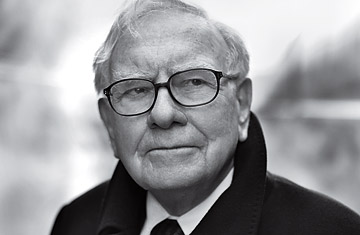
(3 of 9)
His worry is that in this era of late-stage capitalism, the next generations won't be as lucky as he has been. The problem of inequality is likely, he says, to get worse. When people can't climb up the ladder, it's bad for the economy--and for his companies. He doesn't believe that the U.S. can innovate its way quickly back to a 1950s level of shared prosperity, nor does he think education will entirely close the gap. "The truth is that there will always be a bottom 10% in terms of capacity," he says. "Someone in America who has a 90-point IQ is qualified for many fewer jobs today than he was 100 years ago."
The solution, to him, is obvious. "People who make withdrawals from societies' resources--like me with my plane--should have to pay a lot for it." That means not only higher taxes for the rich and an extremely progressive European-style consumption tax but also fewer loopholes for corporations. Buffett says it's "baloney" that corporate America's tax rates are too high and says companies should not be allowed to repatriate profits tax-free. (It'll just encourage more investment to flow overseas.) In general, he says, "I find the argument that we need lower taxes to create more jobs mystifying, because we've had the lowest taxes in this decade and about the worst job creation ever."
THE INNER SCORECARD
It's early December in Omaha, and snow is blowing horizontally across the windshield of Buffett's beige Cadillac DTS. Dressed in a simple checked blue sport jacket, with his hearing aid pointed toward the passenger side of the car, he is driving me to lunch at the Happy Hollow Club. The car has no four-wheel drive and keeps skidding slightly, as Buffett, an enthusiastic speaker, takes his hands off the wheel regularly to gesticulate. I ask him why he doesn't have a driver, and he laughs. "Oh, gosh," he says. "I think if I did anything but drive myself around here, people would just think it was ridiculous!"
Everyone in town knows Buffett. At the country club, which resembles the one in the tiny Indiana farm town where I grew up, we are greeted by a gray-haired woman at a card table, who wishes us Merry Christmas and gives us a ticket for the brunch buffet. It's Sunday morning, and the place is full of families who look as if they've just come from church. Buffett, who has a soft elderly face but moves briskly, stacks a plate high with waffles, bacon and roast beef. Despite his Eisenhower-era diet, which includes 60 oz. of Coke (preferably Cherry) a day, Buffett remains surprisingly trim. "I haven't had a taste of broccoli or asparagus in years!" he boasts. "I formed my thoughts on eating at the age of 5, and I haven't changed them."
Buffett's cultural tastes are equally old school. His icon of beauty is Sophia Loren; his favorite movie is The Bridge on the River Kwai. And his views on wealth redistribution--which are basically the opposite of the trickle-down theory--go back even further, echoing those of another Nebraskan, progressive Democrat William Jennings Bryan, who believed that "if you legislate to make the masses prosperous, their prosperity will find its way up and through every class that rests upon it."
